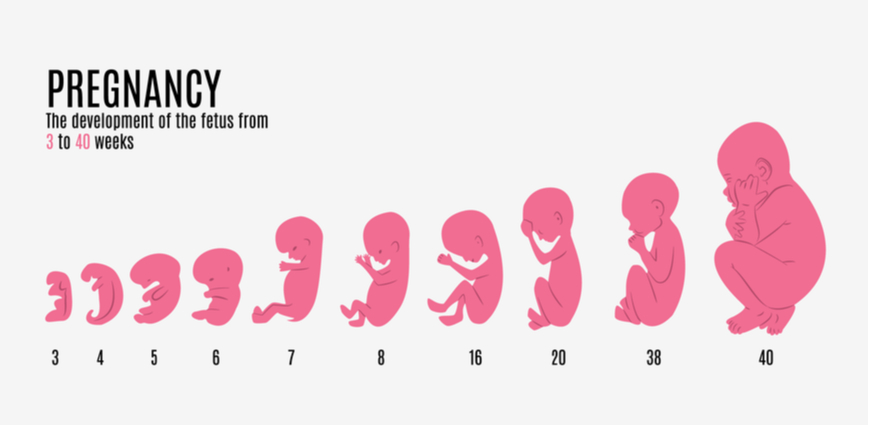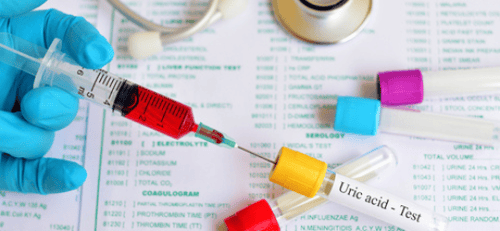As you wrap up the second month of your pregnancy, you’ve had the opportunity to confirm the news and share the thrilling announcement with your partner. Pregnancy is an overwhelmingly exciting time as you plan for your family’s future.
Around the same time, you'll think about how and where to give birth. It is advised to start with antenatal care, but if you have questions or are uncertain about which route to take, you can speak with our maternity concierge via the WhatsApp link below. They can help you through the process.
This blog will explain what else to expect in week 8 of your pregnancy.
As each week progresses your baby grows and your body changes. Subscribe to OT&P week-by-week pregnancy newsletter that provides you with updates on all of these changes and developments whilst preparing you for what is to come.
Physiological Symptoms At 8 Weeks
You’ve probably started to notice the physical changes that your body is experiencing during week 8 of your pregnancy. Your womb has grown to the size of a lemon by the time you're around 7 or 8 weeks pregnant.¹ You may also start to feel tired, your breasts may feel sore and enlarged and finding yourself peeing more than usual.¹
Your heart is working harder by beating slightly faster and pumping more blood. By the third trimester, it will move one and a half times your typical blood supply through your veins.²
Vaginal Discharge at 8 Weeks of Pregnancy
It’s normal to notice an increase in vaginal discharge during pregnancy, especially around the 8-week mark. This discharge, known as leukorrhea, is typically clear or milky white and has a mild odour. Leukorrhea plays a vital role in protecting the vagina and your baby from infections by maintaining a healthy balance of bacteria and keeping the vaginal environment moist.
However, vaginal discharge can change in appearance and texture during pregnancy, and it's important to understand what is considered normal and what may be a cause for concern:
-
Clear Discharge at 8 Weeks Pregnant: Clear or white discharge is generally normal and a sign that your body is working as it should. This discharge may become more noticeable as pregnancy progresses, and while it can be bothersome, it is typically not a cause for worry.
-
Snot-Like Discharge at 8 Weeks Pregnant: Some women notice a discharge that resembles snot or mucus. This is also common and may be an early sign of the formation of the mucus plug, which seals the cervix to protect your baby from infections throughout the pregnancy.
-
Yellow Discharge at 8 Weeks Pregnant: A pale yellow discharge may still be within the normal range, especially if it is thin and doesn’t have a strong odour. However, if the yellow discharge is accompanied by itching, pain, or a foul smell, it could be a sign of infection, and you should consult with your healthcare provider.
-
Mucus Plug at 8 Weeks Pregnant: Around this time, your body may begin forming the mucus plug that will seal the cervix and act as a barrier against bacteria. This plug can vary in appearance and may be clear, white, or slightly yellowish. If you notice thick mucus-like discharge, this could be a sign that the plug is forming.
Since pregnancy comes with a heightened sense of smell, pregnant women may notice a slight change in the odour of the discharge. A strong foul odour, itching, pain, or a yellow-green colour are signs that should be addressed during a checkup with an obstetrician.
Common Symptoms at 8 Weeks of Pregnancy
Aside from changes in vaginal discharge, you may experience a variety of other physical and emotional symptoms as your pregnancy progresses. Here are some of the most common symptoms at 8 weeks:
-
Fatigue: It’s common to feel more tired than usual as your body works harder to support your growing baby. Increased hormone levels, especially progesterone, contribute to fatigue, making you feel more sluggish throughout the day.
-
Nausea and Morning Sickness: Many women experience nausea, which can happen at any time of day, not just in the morning. This symptom is linked to rising hCG levels and usually peaks around this time before easing later in pregnancy.
-
Breast Tenderness: Your breasts may feel sore, swollen, lumpy, or heavier than usual due to hormonal changes. This is your body’s way of preparing for breastfeeding.
-
Increased Urination: As your uterus grows and your body produces more blood, your kidneys are processing extra fluid, and the enlarging uterus also compresses the urinary bladder decreasing its storage capacity, which means more trips to the bathroom.
-
Bloating and Constipation: Pregnancy hormones slow down digestion, which can lead to bloating and constipation. Increasing your fibre intake and staying hydrated can help alleviate these symptoms.
-
Emotional Changes: Hormonal shifts can cause mood swings, irritability, and even tearfulness. It’s normal to feel more emotional during this time as your body adjusts to pregnancy.
The Foetus At 8 Weeks
While the movement of a foetus is still unnoticeable to the mother (that will happen between weeks 16 and 22), and the bump is not prominent (soon to come in week 12), the baby is growing rapidly at 8 weeks from conception.

Size of the Baby at 8 Weeks of Gestation
By the 8th week of pregnancy, your baby is growing rapidly and making significant developmental strides. Here’s what you can expect regarding the baby’s size and development:
- Baby's Size at 8 Weeks: At this stage, your baby is approximately 1.6 cm (0.63 inches) long, about the size of a kidney bean. Though still small, the foetus is growing fast, with major organs and body systems continuing to develop.
- Foetal Development: During week 8, the baby’s facial features, such as the eyes, ears, and upper lip, are beginning to take shape. The limbs are also developing quickly, with arms and legs growing longer and hands and feet starting to form fingers and toes. Inside the body, the brain is growing at a rapid pace, and tiny muscles are beginning to contract, although you won’t feel any movement just yet.
As you progress into the 12th week, you’ll notice more significant growth and changes in your baby’s size and appearance, marking the transition to the next phase of development
What Is The Foetus Doing In Week 8?
In most cases, the foetus is around 1.6 cm or the size of a kidney bean. Around 2 months of pregnancy, the foetus makes major developmental leaps and bounds. The little embryonic tail is disappearing, and the foetus begins to look more human-like. The ears and facial features are already developing, and the gastrointestinal tract is differentiating. The embryo has formed tiny versions of all major organs. While it’s too early to identify the biological sex on ultrasound, the baby’s genitals are budding this week. In week 8, the brain is growing, the bones are building, and the little muscles contract.
What Should I Be Feeling at 8 Weeks Pregnant?
At 8 weeks pregnant, it’s normal to experience a variety of physical and emotional symptoms. Many women report feeling more tired, emotional, or nauseous during this time. Additionally, you might notice:
- Breast Changes: Your breasts may feel swollen, sore, lumpy, and heavier as they prepare for lactation. The areolas (the area around the nipples) may also darken.
- Heightened Sense of Smell: Many women report a heightened sense of smell during early pregnancy, which can contribute to nausea or aversions to certain foods and odours.
- Frequent Urination: As your uterus grows and hormone levels rise, you may find yourself needing to urinate more often.
Listening to your body is key during this stage. Rest when needed, eat small, frequent meals to manage nausea and drink plenty of water to stay hydrated.
Emotional Symptoms at 8 Weeks
You may also notice that your moods rapidly shift during this remarkable time. This is called emotional lability and is caused by the significant changes and hormone shifts occurring within your body. As you focus on bonding with your partner, you may struggle to explain your feelings and why. If you’re usually not very emotional, this change may be startling, but it’s completely normal.
We’ve discussed the onslaught of emotions, physical changes, and ailments that may have occurred to you. Now let’s talk about what you can do about it: self-care! Here are some tips to help you maintain your health and well-being in week 8.
-
Start by increasing your fluid intake because becoming dehydrated while pregnant can cause preterm contractions and urinary tract infections.
-
Pregnant women receive vital health benefits from mind-body practices like yoga and meditation in conjunction with antenatal care. Find a prenatal yoga video or studio and connect with your baby meaningfully.
-
While the caloric increase requirement is minimal in the first trimester, focusing on healthy whole foods that nourish your body and your baby is still important. While it’s okay to occasionally indulge cravings, focus on eating calcium-rich foods, whole grains, fruit and veggies, and lean protein.
-
Listen to your body. If your body says sleep, then rest. When you are starving, eat a nutritious snack. If you are thirsty, refill your water bottle. Your physical needs increase as your body and baby grow and change. The essential advice is to listen to your body!
While you may not be able to see it on the outside, your body and baby are both very busy this week—plan to schedule your first antenatal appointment between weeks 8 and 12 with the OT&P midwives. Receiving care early in pregnancy delivers the best outcomes for both you and your baby.
Around week 12, it’s important to get your routine blood work drawn, known as the pregnancy profile. These tests include blood typing to ensure your blood is compatible with the baby, thyroid testing, and a complete blood count to ensure that the iron and platelet levels are healthy for pregnancy. The panel will also test for pathogens like HIV, Syphilis, Hepatitis B, and Rubella.
You also will have the opportunity to choose to have genetic screening. You will have three options:
-
Safe21 non-invasive prenatal screening from 10 weeks+: This is a blood DNA test that is 99.6% effective and screens for chromosomal abnormalities in your baby like Down syndrome (T21), Edwards syndrome (T18), Patau syndrome (T13), and others. This test will be back in 3 to 5 days.
-
12-week nuchal translucency (NT) ultrasound and blood work: The doctor will take an ultrasound of your babies neck (nuchal fold) and nasal bone and draw OSCAR (one-stop clinical assessment risk) blood work. After the 14th week, it is too late to have the NT ultrasound. This ultrasound can check to see how many babies you are pregnant with and also date your pregnancy with accuracy.
- Panorama prenatal screening test: This non-invasive test screens for the most common genetic conditions (and optionally the baby's gender) as early as nine weeks. It does this by analysing the baby’s (placental) DNA through a blood sample drawn from the mother's arm. Panorama is the only commercially available test that specifically analyses single nucleotide polymorphisms (SNPs) to determine the chromosome copy number.
Receiving care early in pregnancy delivers the best outcomes for both you and your baby. As you can see, there are time constraints on some of these options.
Obstetrics Services in Hong Kong at OT&P
At OT&P, we provide comprehensive obstetrics services to support and guide you throughout your pregnancy. From prenatal care to postnatal support, our team of experienced professionals is dedicated to ensuring your health and well-being, as well as the health of your baby.
Our Obstetrics Services Include:
- Prenatal Screening & Diagnosis: Non-invasive tests to monitor your baby’s health.
- Antenatal Care: Guidance on diet, exercise, and mental health during pregnancy.
- Labour & Delivery Support: Expert obstetric care for a safe birth.
- Postpartum Support: Helping you recover and adjust after delivery.
- High Risk Pregnancy Support: Proper supervision and advice for pregnancies with associated medical conditions such as hypertension and diabetes and multiple gestations.
Book a consultation with our obstetricians today.
References
1. (2018, July). 'You and your baby at 8 weeks pregnant'. NHS UK. Available at: <https://www.nhs.uk/pregnancy/week-by-week/1-to-12/8-weeks/>
2. Ciliberto, C. (1997, November).'Physiological changes associated with pregnancy'.Research Gate. Retrieved February 9, 2021. Available at:<https://www.researchgate.net/publication/267821406_Physiological_Changes_Associated_with_Pregnancy>
 Central General Practice
Central General Practice
 Repulse Bay
Repulse Bay
 Clearwater Bay
Clearwater Bay
 BodyWorX Clinic
BodyWorX Clinic
 Central Specialist Clinic
Central Specialist Clinic
 MindWorX Clinic
MindWorX Clinic
 Partner Clinics
Partner Clinics
 Family Clinic
Family Clinic
 OT&P Annerley Midwives Clinic
OT&P Annerley Midwives Clinic








